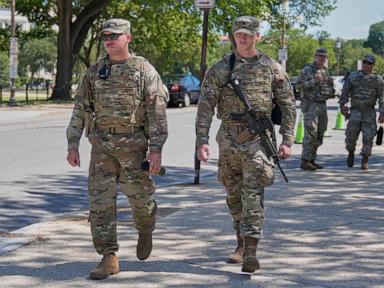Trump Threatens National Guard Deployment Amid Falling Crime Rates

UPDATE: President Donald Trump has just announced a potential deployment of the National Guard to several major cities, including Chicago, New York, Seattle, Baltimore, San Francisco, and Portland. This aggressive move comes as Trump claims these areas are facing rampant crime, yet new data reveals a significant decline in violent crime rates across the nation.
Official statistics show that homicides in the first half of 2025 are down sharply compared to the same period in 2024, continuing a positive trend that has emerged post-pandemic. Despite Trump’s alarming rhetoric, cities like Baltimore have reported a drop in major crimes, with homicides down by over 25% this year.
Recent surveys indicate that while a staggering 81% of Americans view crime as a major problem in urban areas, only 32% support federal intervention in local police matters. This disconnect highlights a growing public sentiment that may not align with Trump’s narrative.
Experts like John Roman, a data specialist at the Center on Public Safety & Justice at the University of Chicago, assert that there is no U.S. city currently facing a true crisis. Roman states, “We’re at a remarkable moment in crime in the United States,” suggesting a need for context in the national conversation about crime.
In Minneapolis, where violent crime has decreased, a recent tragic event saw two children killed during a shooting at a Catholic school Mass. This incident serves as a reminder of the ongoing issues communities face, despite overall crime reductions.
According to the Real-Time Crime Index by AH Datalytics, aggravated assaults, including nonfatal shootings, have also seen a decrease in the targeted cities. Reports show that property crimes like theft and burglary were mostly down in the first six months of 2025. In fact, San Francisco saw a dramatic 51% drop in reported rapes during this period.
Moreover, Trump’s focus on cities governed by Democrats raises questions about his motives. Notably, he has not suggested sending the National Guard to major cities in Republican-leaning states, despite rising crime rates there. For instance, Charlotte, North Carolina, experienced a rise in homicides from 88 in 2023 to 105 in 2024, yet remains untouched by federal intervention calls.
Local leaders in cities targeted by Trump have strongly pushed back against the notion of needing National Guard presence. Maryland Governor Wes Moore stated on social media that “deploying the National Guard for municipal policing purposes is not sustainable or respectful.” Meanwhile, Michael Scott, director of the Center for Problem-Oriented Policing, emphasizes successful community strategies that have led to significant crime reductions without military involvement.
Trump’s portrayal of urban America often leans towards the sensational. His description of cities like Chicago as “killing fields” has sparked criticism and skepticism. Experts warn that deploying the National Guard could instill fear rather than provide reassurance. “It’s going to make residents think: Things must be much worse than I realize,” Scott noted.
As the situation develops, all eyes are on Trump’s next moves and the implications for cities grappling with safety issues. The contrast between his claims and the evidence of declining crime rates suggests a complex narrative that warrants further scrutiny.
Stay tuned for updates as this story unfolds, and explore how local communities are addressing crime through innovative strategies rather than militarized responses.






